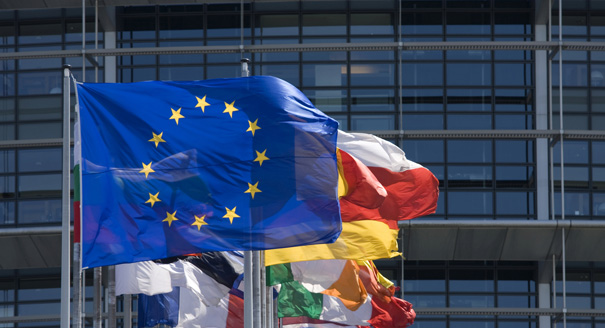Nathalie Tocci, Jan Techau
{
"authors": [
"Jan Techau"
],
"type": "commentary",
"blog": "Strategic Europe",
"centerAffiliationAll": "",
"centers": [
"Carnegie Endowment for International Peace",
"Carnegie Europe"
],
"collections": [],
"englishNewsletterAll": "",
"nonEnglishNewsletterAll": "",
"primaryCenter": "Carnegie Europe",
"programAffiliation": "",
"programs": [],
"projects": [],
"regions": [
"Europe"
],
"topics": [
"Climate Change",
"EU"
]
}
Source: Getty
It's the Democracy, Stupid
In the debate about Europe's political future after the crisis, surprisingly little time is being spent on the key issue of improving political participation for Europe's citizens.
In the debate about Europe's political future after the crisis, surprisingly little time is being spent on the key issue of improving political participation for Europe's citizens. In the grand tradition of the European integration project, discussions about fiscal, banking, and political union tend to center on technocratic regulatory and supervisory elements. They fall short of addressing one of the key problems of EU integration: the lack of proper representation of 500 million Europeans in their shared political project.
To be sure, most of the more far-reaching ideas for a closer union include some electoral elements designed to provide a modicum of political legitimacy. But they all seem to be somewhat of an additional component instead of central to the undertaking. It seems that the proponents of more Europe have a sense of the EU’s democratic problem, but that they don't fully appreciate how prominently the democratic deficit features in Europe's current crisis. Nothing has created as much resentment of the EU project as the disenfranchisement of its citizens. It is neither the economic fallout from incomplete monetary integration, nor the re-nationalization of politics across the board that poses the greatest danger to Europe today. It is its lack of a meaningful say for its people in the political decision-making process.
As a consequence, far-reaching democratic reforms will have to be implemented, no matter whether the crisis will bring about major leaps towards political union or not. This has not really fully sunk in with politicians, parliamentarians, and pundits. Many players on the European chess board seem to believe that the status quo can somehow be maintained for the duration of the crisis. Once the fiscal woes are over, they think, we can go back to where we left things in 2008. This will not be possible. Too much has changed.
The much talked-about re-nationalization of politics is not only the traditional reaction of fearful electorates to tough times. It is, arguably, the very consequence of the democratic deficit of the EU. European leaders have implemented a large number of far-reaching crisis management measures without giving electorates a chance to ponder, debate, and understand their full meaning. The public will accept this as long as there is a clear and present danger that justifies the priority given to swift action over properly understood action.
In open political systems, however, the diktat of circumstances ("there is no alternative") is not endlessly sustainable. Already, counter-movements have formed; everywhere from French unions to German fiscal nationalists. On the surface, they all have very specific and different qualms about the EU as it is today. What unites them is a profound grievance about voices not being heard, procedures not being followed, and the spirit of popular sovereignty being undermined.
The problem is that, even without any other steps toward closer union being taken, the democratization of the EU represents an immense political undertaking. Would reforms of such scope have a realistic chance to be implemented in the current political environment? The reality is that they probably don’t.
Who can imagine treaty changes that would make the European Parliament a fully legitimate, accountable, and credible legislative assembly? Who can imagine political parties in Europe organizing at a pan-European instead of a national level? The only incentive that could make them do that would be to throw open a major chunk of decision-making power at the European level to real political competition through real EU elections, creating pan-European legitimacy for de facto EU government action. But for this to happen, member states would have to surrender some power to a constituency that is not neatly organized along familiar national boundaries. It would mean giving power to an unknown beast called the European citizen. In fact, real European citizens, in the proper sense of the word, would only then be created through such a procedure. To some this would be a dream come true. To most, it would be a realization of their worst fears.
So if real democratic reform seems unlikely right now, how long can the current system hold up without major malfunction or collapse? When will the tipping point be reached where a small and insignificant event can turn into the spark that ignites a bigger fire? The ingredients for such a profound political crisis in Europe are all in place, from economic to identity crisis, from political fear to national awakening. So far, the system holds up remarkably well. But if Europe wants to survive in the longer term, it needs to introduce far-reaching reforms, however difficult and painful they may appear.
About the Author

Director, Europe Team, Eurasia Group
Techau is director with Eurasia Group's Europe team, covering Germany and European security from Berlin. Previously, he was director of Carnegie Europe.
- Can Europe Trust the United States Again?Commentary
- Pre-Reformation Europe and the Coming SchismCommentary
Jan Techau
Recent Work
Carnegie does not take institutional positions on public policy issues; the views represented herein are those of the author(s) and do not necessarily reflect the views of Carnegie, its staff, or its trustees.
More Work from Strategic Europe
- Taking the Pulse: Can European Defense Survive the Death of FCAS?Commentary
France and Germany’s failure to agree on the Future Combat Air System (FCAS) raises questions about European defense. Amid industrial rivalries and competing strategic cultures, what does the future of European military industrial projects look like?
Rym Momtaz, ed.
- Macron Makes France a Great Middle PowerCommentary
France has stopped clinging to notions of being a great power and is embracing the middle power moment. But Emmanuel Macron has his work cut out if he is to secure his country’s global standing before his term in office ends.
Rym Momtaz
- How Europe Can Survive the AI Labor TransitionCommentary
Integrating AI into the workplace will increase job insecurity, fundamentally reshaping labor markets. To anticipate and manage this transition, the EU must build public trust, provide training infrastructures, and establish social protections.
Amanda Coakley
- Can Europe Still Matter in Syria?Commentary
Europe’s interests in Syria extend beyond migration management, yet the EU trails behind other players in the country’s post-Assad reconstruction. To boost its influence in Damascus, the union must upgrade its commitment to ensuring regional stability.
Bianka Speidl, Hanga Horváth-Sántha
- Taking the Pulse: Can the EU Attract Foreign Investment and Reduce Dependencies?Commentary
EU member states clash over how to boost the union’s competitiveness: Some want to favor European industries in public procurement, while others worry this could deter foreign investment. So, can the EU simultaneously attract global capital and reduce dependencies?
Rym Momtaz, ed.










